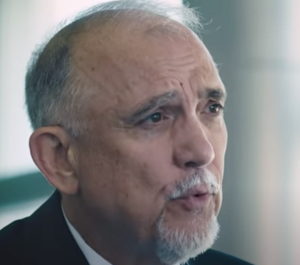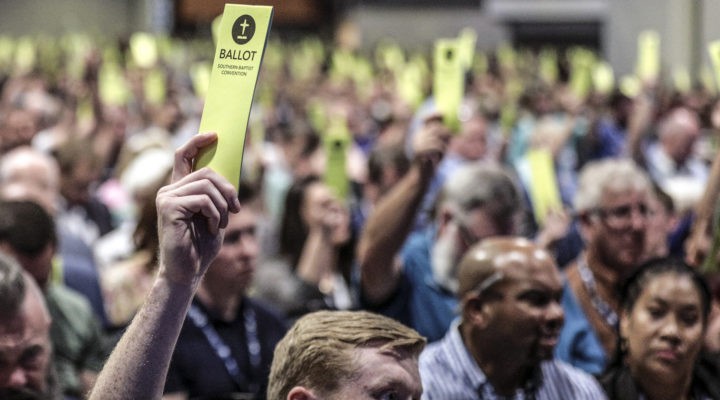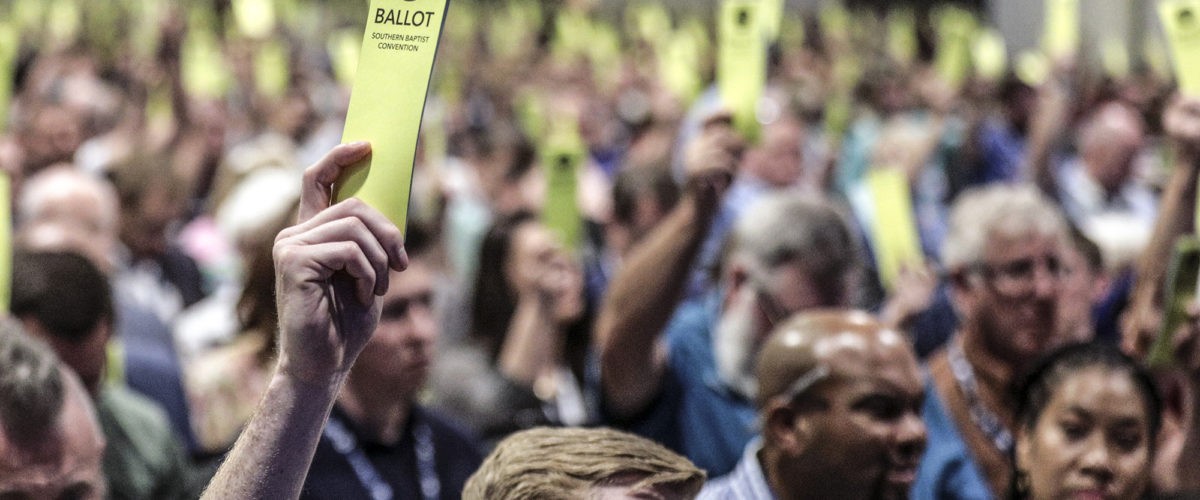Another new group has emerged in the struggle for control of the Southern Baptist Convention — a tug-of-war between traditionalist conservatives and ultra-conservatives.
The Center for Baptist Leadership was introduced on social media March 8 by William Wolfe, a conservative political commentor who has claimed the label of “Christian nationalist” as a positive, not the negative his detractors have intended.

William Wolfe
Wolfe is a former Trump administration staffer and former intern to Southern Baptist Theological Seminary President Al Mohler. He frequently uses his X account to post inflammatory statements of white supremacy, Christian supremacy and male supremacy. He famously took on Beth Moore in December by calling her “an ungodly, even demonic, influence on the SBC.”
He was a contributing editor to a “Statement on Christian Nationalism and the Gospel” that described the ideology as “a set of governing principles rooted in Scripture’s teaching that Christ rules as supreme Lord and King of all creation, who has ordained civil magistrates with delegated authority to be under Him, over the people, to order their ordained jurisdiction by punishing evil and promoting good for His own glory and the common good of the nation.”
That statement added: “Christian nationalism is primarily concerned with the righteous rule of civil authorities, not spiritual matters pertaining to salvation. The desire for a Christian nation is not a distraction from the gospel but rather an effort to faithfully apply all of Scripture to all of life, including the public square. As such, Christian nationalism is not just for civil authorities, just as submitting to Christ’s Lordship is not just for civil authorities but for all people.”
Another person involved in that statement, Oklahoma pastor Dusty Deevers, also is part of the Center for Baptist Leadership. Deevers recently was elected to the Oklahoma Senate and is an abortion abolitionist. He was a co-author of the statement on Christian nationalism.

Dusty Deevers speaking at the “Abolition Now” conference in 2021.
Who’s who
Wolfe is listed as executive director of the new center, along with Richard Henry, associate editor, a Kentucky pastor and podcaster.

Tom Ascol
Members of the advisory board include Deevers; Tom Ascol, pastor of Grace Baptist Church in Cape Coral, Fla., and president of Founders Ministries and The Institute of Public Theology; Mark Coppenger, former president of Midwestern Baptist Theological Seminary and a former vice president at the SBC Executive Committee; Steve Gentry, lead pastor of Village Church in suburban Richmond, Va.; Craig Mitchell, former professor at Southwestern Baptist Theological Seminary and Criswell College, with adjuncts at other schools and ties to the Heritage Foundation and Acton Institute; Lewis Richerson, senior pastor of Woodlawn Baptist Church in Baton Rouge, La.; Sam Webb, a partner at the Houston law firm Webb Strahan and an elder at University Park Baptist Church; and Jon Whitehead, a Missouri attorney who is a trustee of the SBC Ethics and Religious Liberty Commission with ties to the Federalist Society and a long record of involvement in Southern Baptist life, especially in Missouri, as well as work with First Liberty in several high-profile religious liberty cases before the U.S. Supreme Court.

Mark Coppenger
Another group that has been working to move the SBC in a more conservative direction is the Conservative Baptist Network, although the leader of that group, Brad Jurkovich, has been a lightning rod for critics and is involved in a legal dispute in his own church.
It is not apparent what relation, if any, the Center for Baptist Leadership has with the Conservative Baptist Network.
SBC ‘not in good shape’
Wolfe’s social media introduction to the new group said this work matters because the SBC “is one of the most important Christian institutions in our country” but “as it stands today, it’s not in good shape.”
The problem, he said, is that “we have strayed from our conservative theological commitments and traded biblical beliefs for worldly values. Over the last decade, leaders in the SBC allowed CRT, DEI, and feminism to infiltrate our seminaries, our entities and our churches. Like every other institution in America that welcomes these ideological poisons, the SBC is suffering for it. Our mission is being choked out.
“What we need in the SBC now, more than ever, is courageous leaders who will speak the truth, stand on the Bible, and lead the SBC back to our conservative theological and cultural commitments. And that requires a form of leadership we haven’t seen in the SBC for too long. … We need to find, train and equip the next generation of Baptist leaders who know how to discern the times and what to do in response.”
“We have strayed from our conservative theological commitments and traded biblical beliefs for worldly values.”
He said the new center “will serve as a change-oriented think tank for the SBC, ensuring that our denomination remains both biblical and Baptist. It’s easy to criticize. It’s harder to build. We are here to build a better Baptist future in America and around the world.”
‘Revitalize’ the SBC
The group’s website says its mission is “to revitalize the Southern Baptist Convention by cultivating courageous and uncompromising Baptist leadership for the 21st century. Effective leadership for this task must be grounded in Scripture, creation order and historic Baptist commitments, embodied in antifragile Baptist churches and institutions, and proclaimed with a prophetic and attractional voice to those disillusioned by the cultural insanity and civic breakdown in late-modern America.”
The group aims to see a future “where Baptists lead American evangelicals back to a confident, convictional and hopeful Christian vision for the future, both in America and worldwide.”
Those running the SBC today are the successors to the so-called “conservative resurgence” of the 1980s and 1990s. They are, by any outside measure, conservatives. Yet in the eyes of this new group, those current leaders are sliding toward liberalism and “new forms of theological liberalism” amid “the pressures of an emerging post-Christian society.”
Calvinists and non-Calvinists
One of the other great divides among modern-day Southern Baptists is between neo-Calvinists and non-Calvinists. A new Calvinism — claiming to be historic Southern Baptist doctrine — rode the coattails of the conservative resurgence and is stronger today than it has been in a century.
But the Center for Baptist Leadership says it will work with both Calvinists and non-Calvinists.
“The CBL enthusiastically partners with both non-Calvinist and Calvinist Baptist leaders and scholars.”
“The CBL enthusiastically partners with both non-Calvinist and Calvinist Baptist leaders and scholars,” its website says. “We do not require a specific confessional subscription for our advisory board, contributing scholars or other authors. Most individuals associated with CBL will hold beliefs largely aligned with the Baptist Faith and Message 2000 or other historic Baptist confessions, such as the New Hampshire Confession of Faith (1833/1853) or the Second London Baptist Confession of Faith (1677/1689). In a spirit of appropriately grounded ecumenicism, we reserve the right to publish and platform leaders from other denominations who have important theological, cultural or institutional insights that are relevant to Baptists.”
In addition to the Baptist Faith and Message, employees of the organization must affirm the Chicago Statement on Biblical Inerrancy and “must also hold settled convictions on human sexuality and biblical gender roles that are at least as rigorous as those set forth in the Nashville Statement on Human Sexuality and the Danvers Statement on Biblical Manhood and Womanhood.”
Key issues
As for the key challenges facing the SBC today, the website lays out five:
Institutional revitalization of the SBC for the sake of its gospel mission. “While many of the key challenges facing the SBC may appear to be political and cultural, as Christians we know that they are first and foremost theological. … This is the great battle of the ages: The word of God versus the way of the world.”
“This is the great battle of the ages: The word of God versus the way of the world.”
Reaffirming the SBC’s commitment to biblically qualified pastors. “God’s word could not be more precise: A pastor (or elder/overseer) is one of the two God-ordained offices within the local church (the other being the office of deacon) and is reserved for men, and only men, who meet the biblical qualifications in 1 Timothy 3:1-7 and Titus 1:6-9.
The website statement charges some SBC churches “have and celebrate women pastors of one kind or another. This modern phenomenon is not a product of sound theology but rather demonstrates the incursion of secular beliefs indifferent or hostile to the integrity of a New Testament church (such as feminism and egalitarianism) gaining a foothold in the SBC.”
One practical application of this view is to work toward adoption of the Law Amendment at this summer’s SBC annual meeting in Indianapolis. That amendment, which requires a second vote this year, would expel any church that “affirms, appoints, or employs” women “as any kind of pastor or elder.”
“The Center for Baptist Leadership wholeheartedly supports the Law Amendment as the best tool available to Southern Baptists at this time to begin countering the clear and present danger of our egalitarian drift,” the site says. The SBC must decide whether it will compromise on God’s word or heed the call to submit to God’s good order for his church and defend its clear, confessional commitments on this matter.”
Securing fiscal transparency. This relates to ongoing critiques of current SBC leaders for inappropriate spending and lack of full financial accounting to SBC annual meeting messengers. The statement particularly calls out former leaders of Southwestern Baptist Theological Seminary as well as NAMB, Lifeway Christian Resources and the SBC Executive Committee.
Recovering biblical standards of justice and Baptist accountability. The group takes specific aim at the ongoing reckoning over mishandled knowledge of sexual abuse in SBC churches, outlined in the damning Guidepost Solutions investigation two years ago. While affirming that “every instance of abuse is a sin against God and man,” the new group disagrees with the path the SBC has taken in response.
“They pushed messengers to make the SBC responsible for wrongs it did not commit.”
“Many SBC leaders, caught up in the spirit of the worldly ‘MeToo’ movement, DEI ideology, and social justice signaling have imported perverse, anti-Christian standards of justice to judge claims of abuse,” the website states. “Untrustworthy former leaders who grew tired of the Executive Committee’s oversight pushed to harm the EC by forcing the waiver of attorney-client privilege. They pushed messengers to make the SBC responsible for wrongs it did not commit. They sacrificed local church autonomy to become ‘influencers’ on SBC committees.”
The group condemns the work of two special task forces assigned to address the problem of sexual abuse and charges that “millions of offering plate dollars have now gone to these consultants and lawyers with very little to show for it.” And they also condemn plans to create an independent nonprofit to monitor reports of sexual abuse and provide abuse-prevention resources to churches.
“This creation of such a religious hierarchy, absent accountability, over local Baptist churches violates the Baptist Faith and Message, would not help victims, and would not advance the gospel. It would only pay ‘experts’ to judge between local churches and accusers in ways that violate biblical justice.”
Restoring mission fidelity to the ERLC, NAMB and other entities. The website statement accuses the ERLC of “advancing positions and issues that are at odds with the majority of honorable Southern Baptists,” including “promoting forms of amnesty for illegal aliens.”
And the ERLC is not willing to go far enough in opposing all abortion, the group claims: “In the wake of the Dobbs ruling overturning Roe, the ERLC has targeted pro-life and abortion abolition advocates for ‘overreach’ in their urging that abortion be counted as murder — and all parties involved be held appropriately liable for their role in ending a pre-born life.”
Additional criticism is given for NAMB and its record of church planting, which is its primary task and also its greatest area of critique from within the denomination. Others beyond this group have accused NAMB of spending millions of dollars more to produce less results than ever before, while angering state Baptist convention leaders.
Related articles:
To claim the label of Christian nationalist or not? | Analysis by Rodney Kennedy
Abortion abolitionist pastor running for state Senate in Oklahoma
When angry white men can’t give up hating Beth Moore | Analysis by Mark Wingfield


